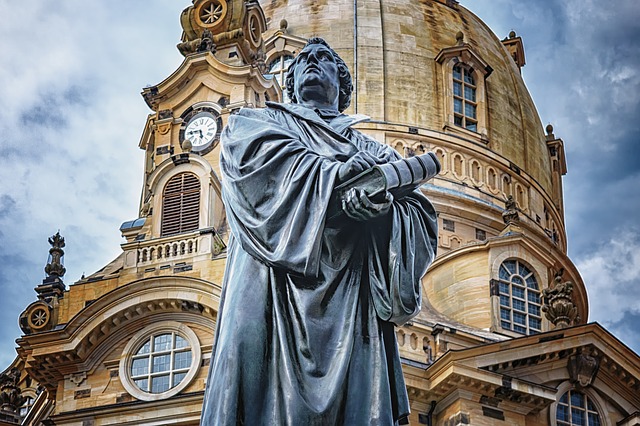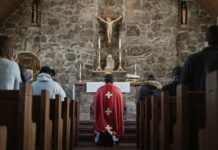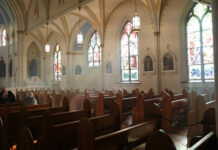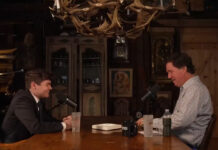While we mark this very important event, it’s equally important to remember that the Church did not begin in 1517.
Christians have a deep and valuable history, one that includes the wisdom and passion for Christ, of our Catholic brothers and sisters.
We may find disagreement, but we find solidarity at the foot of the cross and at the door of the empty tomb.
The day has as much to do with Roman Catholics as it does Protestants. Reformation day reminds us of the importance of Anselm of Canterbury’s (1033-1109) motto, faith seeks understanding; contemplation of God is ‘faith in search of understanding’ (fides quaerens intellectum).
“I seek not, O Lord, to search out Thy depth, but I desire in some measure to understand Thy truth, which my heart believeth and loveth. Nor do I seek to understand that I may believe, but I believe that I may understand. For this too I believe, that unless I first believe, I shall not understand.” [i]
Martin Luther lived out Anselm’s standard. I would even say with confidence, Luther breathed Anselm’s prayer. His voice and work is buttressed by it; the 95 theses may never have driven its points into the consciousness of the world, beyond the door the theses was nailed to, without it.
Without Anselm’s ‘faith seeks understanding’ the idols and the corruption of Luther’s age would have stood without challenge, and carried on without change. Luther was a man who applied faith in search of understanding, not in order to believe, but in order to understand.
Luther wasn’t advocating revolution. In the end he was bound to this thing we call The Reformation. The momentum that he sparked swept him up in the inevitable conflicts it ignited, conflicts that arise wherever corruption and power is challenged.
This movement took him to places both dark and full of light. He struggled with depression, and justifiably feared for his life. While this doesn’t excuse his well-known rants against Jewish non-believers, often referred to by opponents as his antisemitism, they were given in old age. By that time he was a seasoned intellectual who had seen more than he had ever anticipated.
500 years ago a monk stood before the Goliaths of his day. He spoke with a degree of innocence, believing the authorities would hear and receive; authorities who read the same bible he read; who were supposed to be guided by same words Anselm spoke.
Luther wasn’t naive to think his challenge would convict those above him. His disgust at the corruption he saw in Rome surrounding the Church of the early 1500s came from a fire within that only God could birth.
And birth it He did. The Reformation was a refining fire. Today, its candle still burns, equally reminding humanity of the gift of faith and reason. The nail banged into the wood of the church door in Wittenburg challenges us today to check each step, to discern if what we are being taught matches with the wisdom and revelation testified to us in the Biblical text: To “destroy arguments and bring every lofty opinion raised against the knowledge of God, taking every thought captive to obey Christ.” (1 Cor.10:4-5, ESV)
From political extremes to the cults of modern liberalism, to the pressure to read everything in life through a Marxist, Social Darwinist, or ultra-conservative lens, The Reformation speaks to us today.
One place this is heard is through the life and thought of Jacques Ellul. Ellul was a French theologian who is better known for his work in philosophy than theology. He was a student of Karl Barth and a leader in the French resistance during World War Two. He worked alongside Christians and communists, and witnessed the curious subjection of the former to the latter.
As a Christian well schooled in Marxism, Ellul was not a fan of Christian Marxism. He opposed those who advocated a commonality between Christianity and Communism, and he laid a barrage of criticism in the direction of liberation theologians, whom he saw as inconsistent and hypocritical. They rightly questioned the excesses of capitalist democracies, but “they didn’t [and still don’t] question socialist or Communist dictatorships.” (Jesus & Marx, 1988:59) [ii]
Ellul’s broadside against liberation theology reflects the spirit of The Reformation. He regards liberation theology as “a tool of propaganda” (1988:60). However well-intentioned liberation theology may be, its path results in “syncretism, and dizzying intellectual acrobatics, where Jesus is tortured to make Him fit into confining categories. This is an adulterated faith. Christians who followed this path either twisted scripture or forgot it.” (1988 pp.48-52).[iii]
“Situating everything in Marxism is intellectual terrorism.” (1988 pp. 22-26) [iv]
The final part of this broadside is the theological bomb Elull throws into the masses of blind conformists:
“Arrogant and impudent accusations that the Church has always sided with the powerful and supported the state and the ruling classes amount to abominable historical lies. Accepting the Marxist lie about the Church in this fashion implies that the Church has always been a perfectly unified whole, exercising a single function with just one doctrine!”
(Jesus & Marx, 1988:49) [v]
Among other examples throughout Church history, The Reformation smashes the assumption that the Church has always sided with the powerful and supported the State. It is single-handedly corrected by a monk, who inspired a back-to-basics change, as he spoke truth in love before an establishment who threatened his life and showed him nothing but contempt.
This article was originally published at http://www.rodlampard.com/










